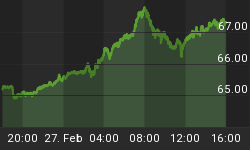Things are about to get much worse for the citizens of Venezuela, whose government continues to default on its mountains of debt, rendering it excluded from global financial markets.
In November 2017, Venezuela defaulted on its debts for the first time after a hyperinflationary environment finally took its toll on the once-wealthy socialist state. Prior to this period, President Nicolas Maduro’s government had put on a brave face and dutifully continued honoring its debt obligations--especially the infamous “hunger bonds”--while millions of citizens were starving.
Since then, the government and state-owned companies have continued sinking deeper in debt and now owe nearly $8 billion in unpaid bond interest and principal.
Creditors and now coming to call on Venezuela…
The Wall Street Journal has reported that some investment funds and companies have demanded that the Venezuelan government pay $1.5 billion in principal and outstanding interest on the 2034 bond VE018389347 in what is likely to be a first step in a potential legal campaign by investors to recover their funds.
Harsh Lessons from Argentina
This move could trigger similar efforts by investors holding a total of $60 billion in outstanding bonds issued by the government and state-owned oil giant, Petróleos de Venezuela (PDVSA). That, in turn, could escalate into a massive credit crisis similar to the one that roiled Argentina for more than a decade.
In 2016, the Argentinian government was forced to pay several times the original investments after defaulting on bonds for 14 years. The repayment was a necessary pre-condition for the country to rejoin global financial markets after being locked out for nearly 15 years.
The radical move by the Venezuelan investors is known as “acceleration”, which means the bonds in default must be paid immediately. In practice though, it’s much more likely that Venezuela either won’t pay or can’t pay, which could lead to years of litigation before investors are able to recoup their money. Related: Walmart Goes On Digital M&A Spree To Compete With Amazon
The acceleration move coincides with a growing wave of unrest among Venezuelan creditors including Crystallex, a Canadian mining company seeking to recover $1.4 billion as compensation for a state takeover of its assets a decade ago. Investors holding defaulted Venezuela and PDVSA bonds have until now held their peace probably in a bid to avoid a lengthy court settlement. Few creditors believe now Maduro has the necessary political will to carry out a comprehensive restructuring process that’s deemed necessary to put things back on track and patience is running out.
Juicy Yields
The big draw by Venezuela and PDVSA bonds, of course, is their juicy yields thanks to the high risk of default by the Venezuela government and government-owned companies. The risk is especially high now that crude prices have tumbled and production appears to be in an endless tailspin.
Although the U.S. government has banned its citizens from buying Venezuelan bonds, investors can still buy them on secondary markets. That way they can at least have some peace of mind that their money is going to an investment bank and not supporting an autocratic government.
Related: The Corporate Buyback Bubble Is Bursting
For investors with existing positions, Bloomberg provides a status update of Venezuelan bonds on this page. Looking at the page provides some interesting findings: some PDVSA bonds have been settled after several receiving selective default status while virtually all VENZ bonds remain in default.
In other words, some bonds issued by PDVSA are being honored while those by the Venezuela government remain unpaid.
If that strikes you as being rather odd, there’s a method to the madness: some PDVSA bonds are partly backed by Citgo, the U.S.-based refining and gas-station company located in Houston, Texas. Citgo continues to have PDVSA as a key buyer of its oil thus keeping a principal source of much-needed dollars flowing.
Venezuela owns the world’s largest oil reserves but has seen output decline 30 percent since 2017 due to infrastructural failures after years of mismanagement.
By Alex Kimani for Safehaven.com
More Top Reads From Safehaven.com
















